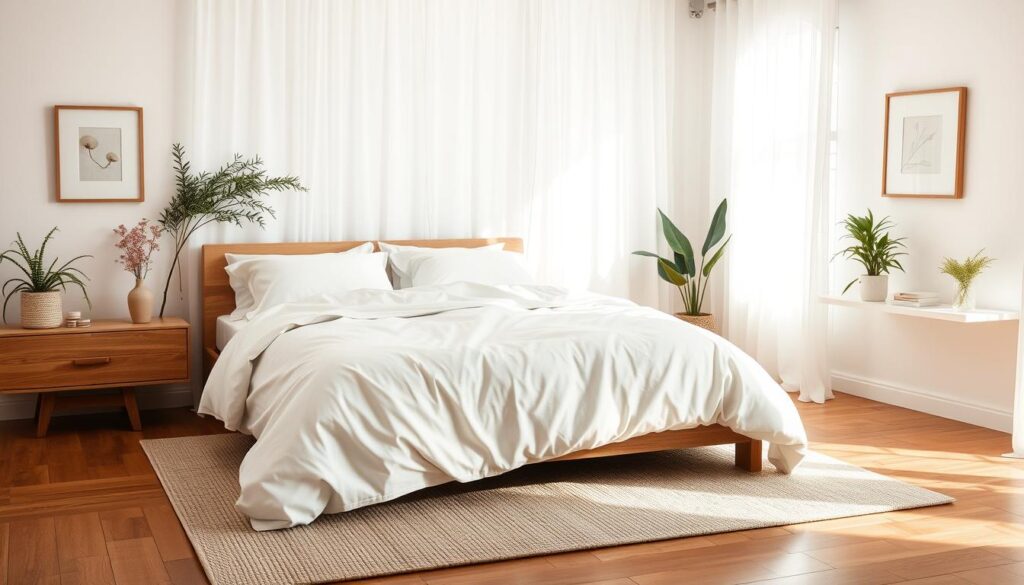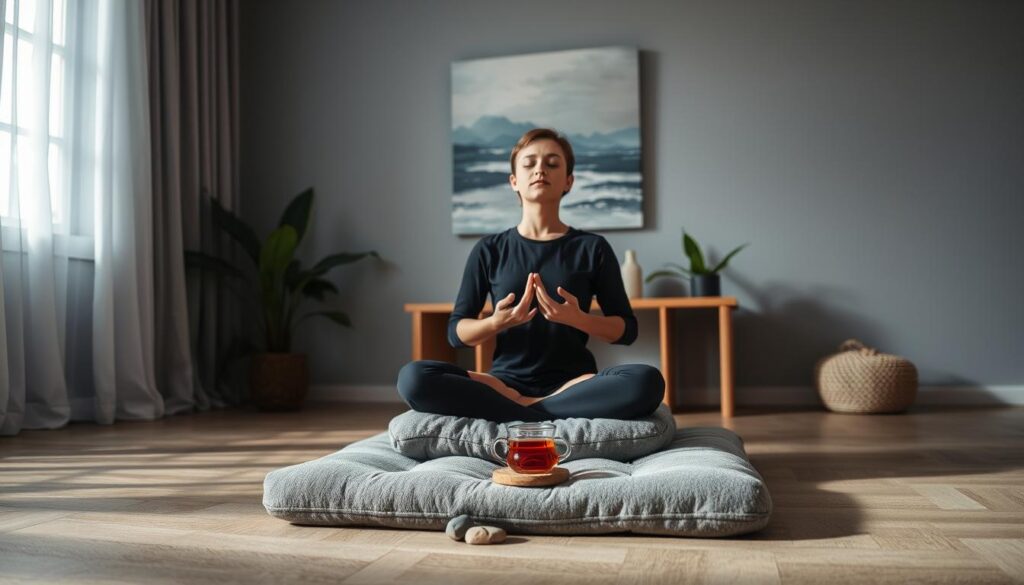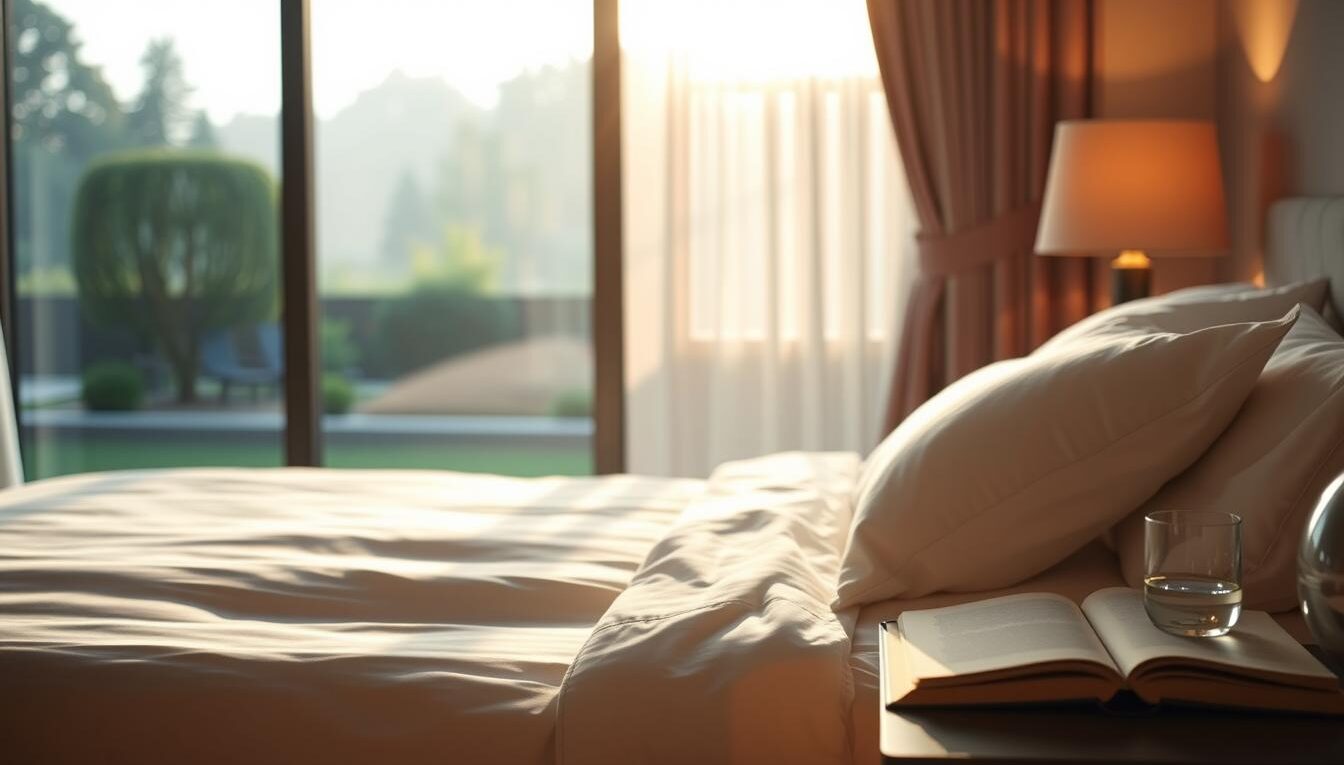Simple Tips for Better Sleep Naturally
Getting a good night’s sleep is crucial for your overall health. Quality sleep plays a significant role in physical and mental rejuvenation. When you don’t get enough restful sleep, it can affect your mood, energy levels, and productivity.
Understanding your sleep cycles and creating a sleep-friendly environment can significantly improve the quality of your sleep. By making a few simple changes to your daily routine, you can fall asleep faster and wake up feeling refreshed.
Key Takeaways
- Establish a consistent sleep schedule
- Create a relaxing bedtime routine
- Avoid caffeine and electronics before bedtime
- Make your sleep environment comfortable
- Try relaxation techniques, such as deep breathing or meditation
The Importance of Quality Sleep
The significance of quality sleep cannot be overstated, as it impacts nearly every aspect of health. Quality sleep is crucial for overall wellbeing, affecting both physical and mental health.
How Sleep Affects Your Physical Health
Sleep plays a vital role in maintaining physical health by regulating stress hormones, repairing and regenerating tissues, and supporting a healthy immune system. During sleep, your body works to repair any damage caused by stress, utilizing natural detoxification methods to cleanse your body. Adequate sleep helps in maintaining the balance of hormones that regulate hunger and fullness, supporting overall physical wellbeing.
The Connection Between Sleep and Mental Wellbeing
Sleep has a profound impact on mental wellbeing, influencing mood, cognitive function, and emotional stability. Adequate sleep helps to regulate emotions, reducing the risk of mental health disorders. Home remedies for body detox can complement good sleep practices, further enhancing mental clarity and emotional balance. By prioritizing sleep, you can improve your mental resilience and overall quality of life.
Understanding the importance of quality sleep is the first step towards improving your sleep naturally. By making sleep a priority, you can take significant strides towards enhancing both your physical and mental health.
Understanding Your Sleep Cycles
The key to a restful night’s sleep lies in understanding your sleep cycles. Sleep cycles are crucial for physical and mental rejuvenation. To improve sleep quality, it’s essential to grasp the different stages of sleep and how they impact your overall wellbeing.
The Science Behind Sleep Stages
Sleep is divided into REM (Rapid Eye Movement) and non-REM stages. Non-REM sleep is further divided into three stages, each with distinct brain wave patterns. Understanding these stages can help you identify patterns and issues in your sleep. For instance, a healthy sleep cycle typically begins with non-REM sleep, followed by REM sleep, and this cycle repeats throughout the night.
- Stage 1: Transitioning from wakefulness to sleep
- Stage 2: Light sleep before entering deeper sleep
- Stage 3: Deep sleep, crucial for physical repair
A good night’s sleep involves multiple cycles of these stages. Maintaining a healthy sleep cycle is linked to overall health, much like following a plano de dieta detox em casa can aid in bodily detoxification and overall wellness.
Identifying Your Chronotype and Natural Rhythms
Your chronotype influences your sleep-wake cycle, determining whether you’re a morning lark or a night owl. Recognizing your chronotype can help you optimize your sleep schedule. For example, if you’re naturally more alert in the mornings, you might find it easier to wake up early. Aligning your sleep schedule with your natural rhythms can improve the quality of your sleep, much like how a consistent routine can support a successful desintoxicação corporal em casa.
Creating a Sleep-Friendly Environment
Transforming your bedroom into a sleep sanctuary is crucial for a restful night’s sleep. This involves optimizing several factors to create an ideal sleep environment.
Optimizing Your Bedroom Temperature
Maintaining a cool bedroom temperature is essential for better sleep. The ideal temperature range is between 60°F and 67°F (15.5°C and 19.4°C), which can help promote deeper sleep. Avoid overheating or overcooling, as both can disrupt your sleep patterns.
Light Management for Better Sleep
Light exposure significantly affects your sleep-wake cycle. Managing light in your bedroom is crucial for improving sleep quality.
Blackout Curtains and Sleep Masks
Using blackout curtains or sleep masks can effectively block out light, creating a dark environment that fosters sleep. This is particularly useful for individuals who sleep during the day or live in areas with excessive street lighting.
Nightlights and Morning Light
While darkness is essential for sleep, a nightlight can be useful for navigation during nighttime awakenings. Additionally, exposure to natural morning light helps regulate your circadian rhythms, making it easier to wake up.
Noise Control Strategies
Noise is a significant disruptor of sleep. Implementing noise control strategies can help minimize disruptions and improve sleep quality.
| Noise Control Method | Description | Effectiveness |
|---|---|---|
| Earplugs | Disposable or custom-made plugs that block sound | High |
| White Noise Machines | Devices that produce constant, soothing sounds | High |
| Soundproofing | Materials and techniques to reduce sound transmission | Variable |

By implementing these strategies, you can significantly enhance your sleep environment, leading to better rest and overall health. Techniques such as maintaining an optimal bedroom temperature, managing light exposure, and controlling noise levels are akin to dicas de desintoxicação em casa (home detox tips) and técnicas de desintoxicação holística (holistic detox techniques), as they help cleanse your sleep space of disruptive elements.
Establishing a Consistent Bedtime Routine
Creating a soothing bedtime routine is key to unlocking restful sleep. By establishing a consistent pre-sleep routine, you can signal to your body that it’s time to wind down and prepare for a rejuvenating night’s sleep.
Setting and Maintaining Sleep Schedules
Setting a regular sleep schedule is crucial for regulating your body’s internal clock. Go to bed and wake up at the same time every day, including weekends, to maintain consistency and improve the quality of your sleep.
Calming Pre-Sleep Activities
Engaging in calming activities before bed can help you relax and prepare for sleep. Consider incorporating activities like reading, journaling, or gentle stretching into your bedtime routine.
Reading and Journaling
Reading can be a great way to unwind before bed, as it distracts you from the stresses of the day. Journaling, on the other hand, allows you to process your thoughts and emotions, clearing your mind for a restful night’s sleep.
Gentle Stretching and Self-Care
Gentle stretching can help release tension and relax your muscles, making it easier to fall asleep. Incorporating self-care practices, such as meditation or deep breathing, can also promote relaxation and improve sleep quality.
Habits to Avoid Before Bedtime
Avoid stimulating habits before bedtime, such as using electronic devices or consuming caffeine. Instead, opt for relaxing activities that promote a restful night’s sleep, such as those mentioned earlier. By avoiding stimulating activities and incorporating calming practices, you can improve the quality of your sleep and wake up feeling refreshed.
Simple Tips for Better Sleep Naturally
You can enhance your sleep quality naturally by incorporating a few straightforward practices into your daily routine. By making some simple changes, you can improve the quality of your sleep and wake up feeling refreshed and rejuvenated.
Quick Fixes for Tonight’s Sleep
To improve your sleep tonight, consider these quick fixes:
- Avoid caffeine and heavy meals close to bedtime.
- Create a relaxing bedtime routine, such as reading or taking a warm bath.
- Optimize your sleep environment by ensuring it is dark, quiet, and at a comfortable temperature.
These simple adjustments can significantly impact the quality of your sleep. For instance, using blackout curtains or earplugs can help create an ideal sleep environment.

Long-Term Strategies for Consistent Sleep Improvement
For long-term sleep improvement, consider the following strategies:
- Establish a consistent sleep schedule to regulate your body’s internal clock.
- Engage in regular physical activity, but avoid vigorous exercise before bedtime.
- Practice stress management techniques, such as meditation or deep breathing exercises, to calm your mind before sleep.
By incorporating these habits into your daily routine, you can achieve better sleep naturally and improve your overall well-being. Remember, consistency is key to developing healthy sleep habits.
Nutrition and Diet for Restful Sleep
What you eat can significantly impact your sleep quality. A diet rich in certain nutrients can promote better sleep, while consuming the wrong foods can disrupt your sleep patterns.
Sleep-Promoting Foods and Nutrients
Incorporating specific foods and nutrients into your diet can enhance your sleep. Two key elements are tryptophan-rich foods and magnesium.
Tryptophan-Rich Foods
Tryptophan is an amino acid that helps produce serotonin and melatonin, neurotransmitters that regulate sleep. Foods high in tryptophan include:
- Turkey
- Chicken
- Fish
- Beans
- Eggs
Magnesium and Other Key Minerals
Magnesium is a mineral that can help relax the body and promote better sleep. Include magnesium-rich foods like:
- Dark leafy greens
- Nuts
- Seeds
Foods and Beverages That Disrupt Sleep
Some foods and drinks can negatively affect your sleep. Avoid consuming:
- Caffeine
- Alcohol
- Heavy meals close to bedtime
- Spicy foods
Strategic Meal Timing for Sleep Quality
Eating at the right times can also impact your sleep. Try to:
- Have your last meal a few hours before bedtime
- Avoid heavy snacks before sleeping
| Food Type | Effect on Sleep | Timing Tip |
|---|---|---|
| Tryptophan-rich foods | Promotes sleep | Consume in the evening |
| Caffeine | Disrupts sleep | Avoid after lunch |
| Heavy meals | Can disrupt sleep | Eat earlier in the evening |

Physical Activity and Sleep Quality
You can enhance your sleep quality through consistent physical activity. Engaging in regular exercise not only improves your overall health but also helps regulate your sleep patterns. Physical activity can help reduce stress and anxiety, making it easier to fall asleep and stay asleep throughout the night.
Exercise Types That Enhance Sleep
Different types of exercises can have varying effects on sleep. Incorporating a mix of aerobic activities and gentle movements like yoga can be particularly beneficial.
Aerobic Activities
Aerobic exercises, such as running, cycling, or swimming, are effective in improving cardiovascular health and promoting better sleep. These activities help reduce symptoms of insomnia and sleep apnea.
Yoga and Gentle Movement
Yoga and other gentle movements, like tai chi, can help relax your mind and body before bed. These activities reduce stress and improve flexibility, making it easier to fall into a deep sleep.
When to Exercise for Optimal Sleep Benefits
The timing of your exercise routine can significantly impact your sleep. Exercising too close to bedtime can sometimes interfere with sleep, as it can increase your heart rate and body temperature. However, regular physical activity during the day can contribute to improved sleep quality at night. Finding the right balance is key.
To detoxify your body naturally at home and improve sleep, consider incorporating morning or early afternoon exercise routines. This timing can help regulate your circadian rhythms and enhance overall sleep quality.

Stress Management and Relaxation Techniques
To improve your sleep quality, it’s essential to incorporate stress management and relaxation techniques into your daily routine. Chronic stress can significantly disrupt sleep patterns, making it challenging to fall asleep or stay asleep throughout the night. By adopting effective relaxation methods, you can calm your mind and body, preparing yourself for a restful night’s sleep.
Meditation and Mindfulness for Better Sleep
Meditation and mindfulness practices have been shown to reduce stress and anxiety, promoting a peaceful state of mind that is conducive to sleep. Regular meditation can help regulate your sleep patterns by reducing rumination and worry. You can start with guided meditation apps or videos that lead you through relaxation exercises.

Effective Breathing Exercises
Effective breathing exercises can calm your nervous system, reducing stress and promoting relaxation. Techniques such as diaphragmatic breathing, also known as belly breathing, can slow down your heart rate and lower your blood pressure, making it easier to fall asleep. Practice breathing exercises regularly to enhance their effectiveness.
Progressive Muscle Relaxation and Body Scanning
Progressive muscle relaxation involves tensing and relaxing different muscle groups in your body, helping to release physical tension. Body scanning, a related technique, involves paying attention to different parts of your body, releasing any tension as you exhale. These practices can be particularly helpful when done before bed, as they promote a state of relaxation.
| Technique | Description | Benefits |
|---|---|---|
| Meditation | Practice mindfulness and meditation to calm the mind | Reduces stress and anxiety, promotes relaxation |
| Breathing Exercises | Use diaphragmatic breathing to slow down heart rate | Lowers blood pressure, calms the nervous system |
| Progressive Muscle Relaxation | Tense and relax different muscle groups | Releases physical tension, promotes relaxation |
Natural Supplements and Remedies
Natural supplements and remedies can be a valuable addition to your sleep improvement strategy. While they can be beneficial, it’s essential to use them wisely and under the guidance of a healthcare professional.
Herbal Teas and Their Sleep Benefits
Herbal teas have been used for centuries to promote relaxation and improve sleep quality. Two notable examples are:
- Chamomile and Valerian Root: Known for their calming effects, these herbs can help soothe your mind and body before sleep.
- Lavender and Lemon Balm: These herbs are also popular for their ability to promote relaxation and reduce stress.
Essential Oils for Sleep Enhancement
Essential oils like lavender can be used in a diffuser or applied topically to promote relaxation. Using essential oils can be a simple yet effective way to enhance your sleep environment.
Supplements to Consider (With Caution)
Some supplements can help improve sleep, but they should be used with caution and under professional guidance.
- Melatonin: A hormone that regulates sleep-wake cycles. It’s available as a supplement and can be effective for some people.
- Other Natural Sleep Aids: Supplements like valerian root and GABA can also promote relaxation and improve sleep quality.
Remember, it’s crucial to consult with a healthcare professional before adding any new supplements to your routine.
When to Seek Professional Help
While many sleep issues can be resolved through lifestyle changes, some may necessitate consulting a professional. If you’ve tried various remedies without success, it’s crucial to understand when your sleep problems require more than just simple fixes.
Recognizing Serious Sleep Disorders
Serious sleep disorders can significantly impact your quality of life. Symptoms like persistent insomnia, excessive daytime sleepiness, or unusual behaviors during sleep (such as sleepwalking or night terrors) may indicate a more serious condition. If you’re experiencing these symptoms regularly, it’s time to seek help. Conditions like sleep apnea, restless leg syndrome, or narcolepsy can be diagnosed and treated by professionals.
Types of Sleep Specialists and Treatments
Sleep specialists come from various medical backgrounds, including pulmonology, neurology, and psychiatry. They can offer a range of treatments, from behavioral therapies to medication. Cognitive Behavioral Therapy for Insomnia (CBT-I) is a common treatment approach that addresses underlying sleep issues. In some cases, sleep studies or polysomnography may be recommended to diagnose sleep disorders accurately.
Seeking professional help can be a significant step towards improving your sleep health. Don’t hesitate to consult a healthcare professional if you’re concerned about your sleep.
Conclusion
By implementing the simple tips outlined in this article, you can significantly improve your sleep quality. Creating a sleep-friendly environment, establishing a consistent bedtime routine, and incorporating a balanced diet, such as a plano de dieta detox em casa, can help you achieve restful sleep.
Additionally, being mindful of your overall lifestyle and stress levels can further enhance your sleep. Consider exploring dicas de desintoxicação em casa to support your overall wellbeing. By making these adjustments, you can wake up feeling refreshed and rejuvenated, ready to tackle the day with energy and clarity.


